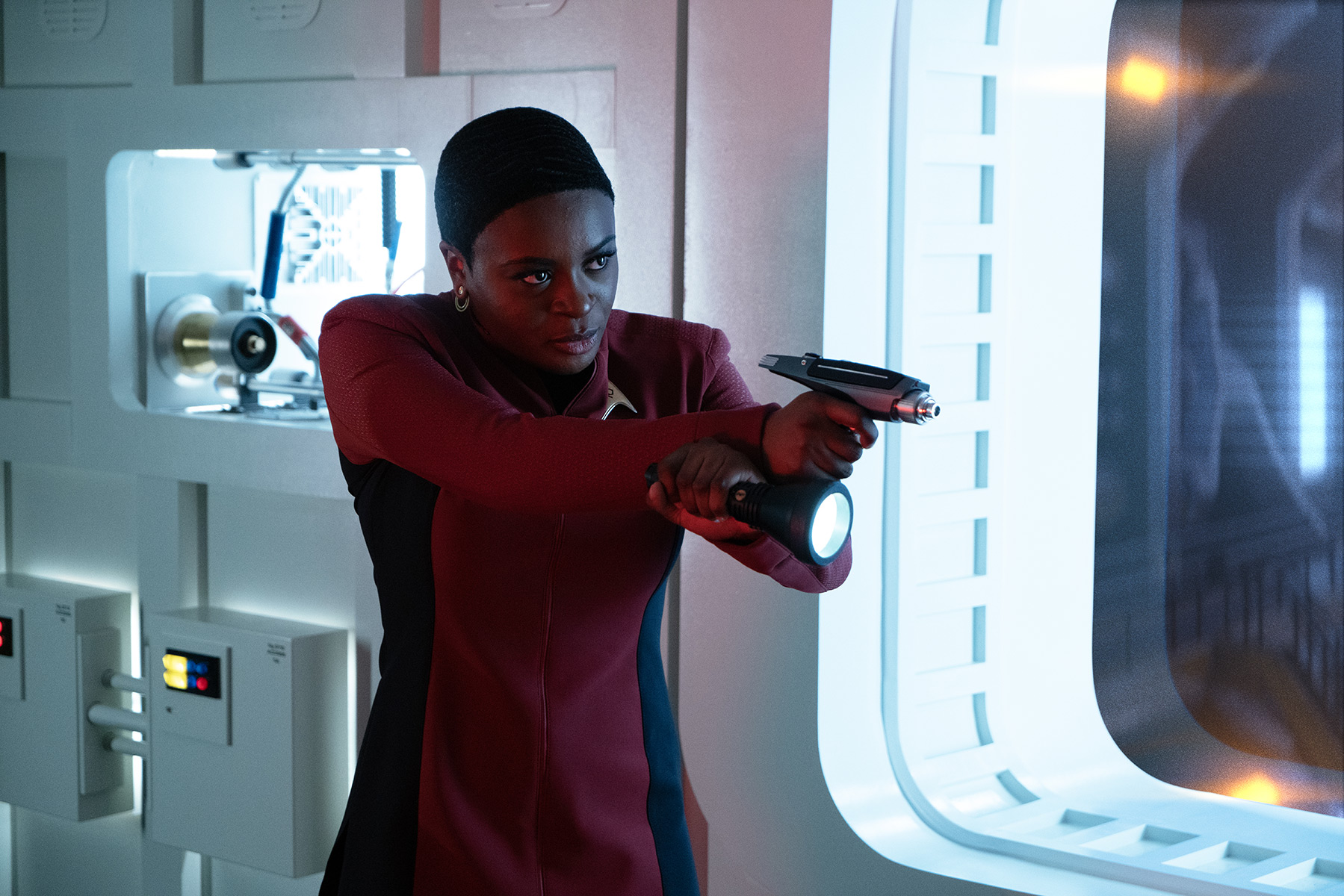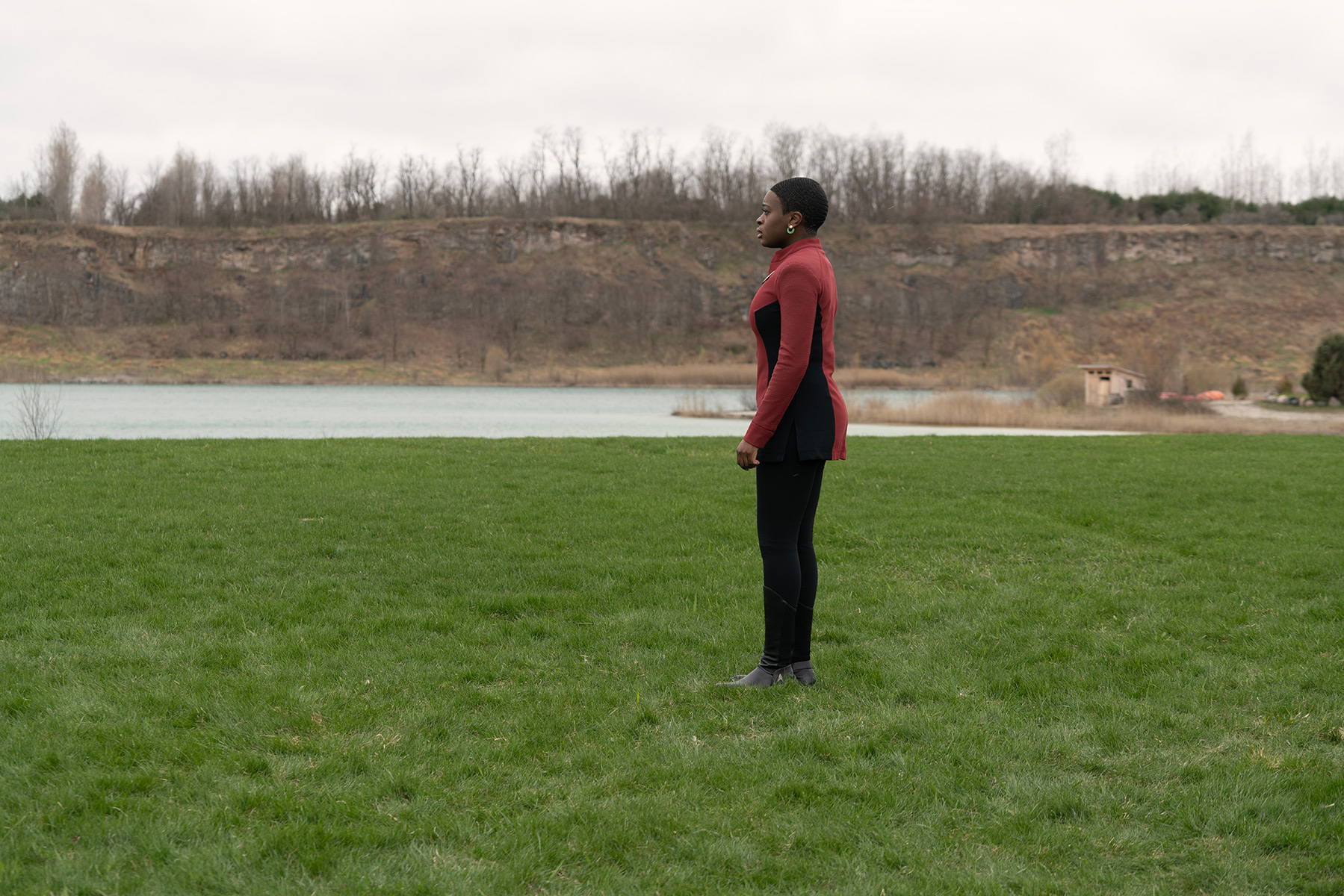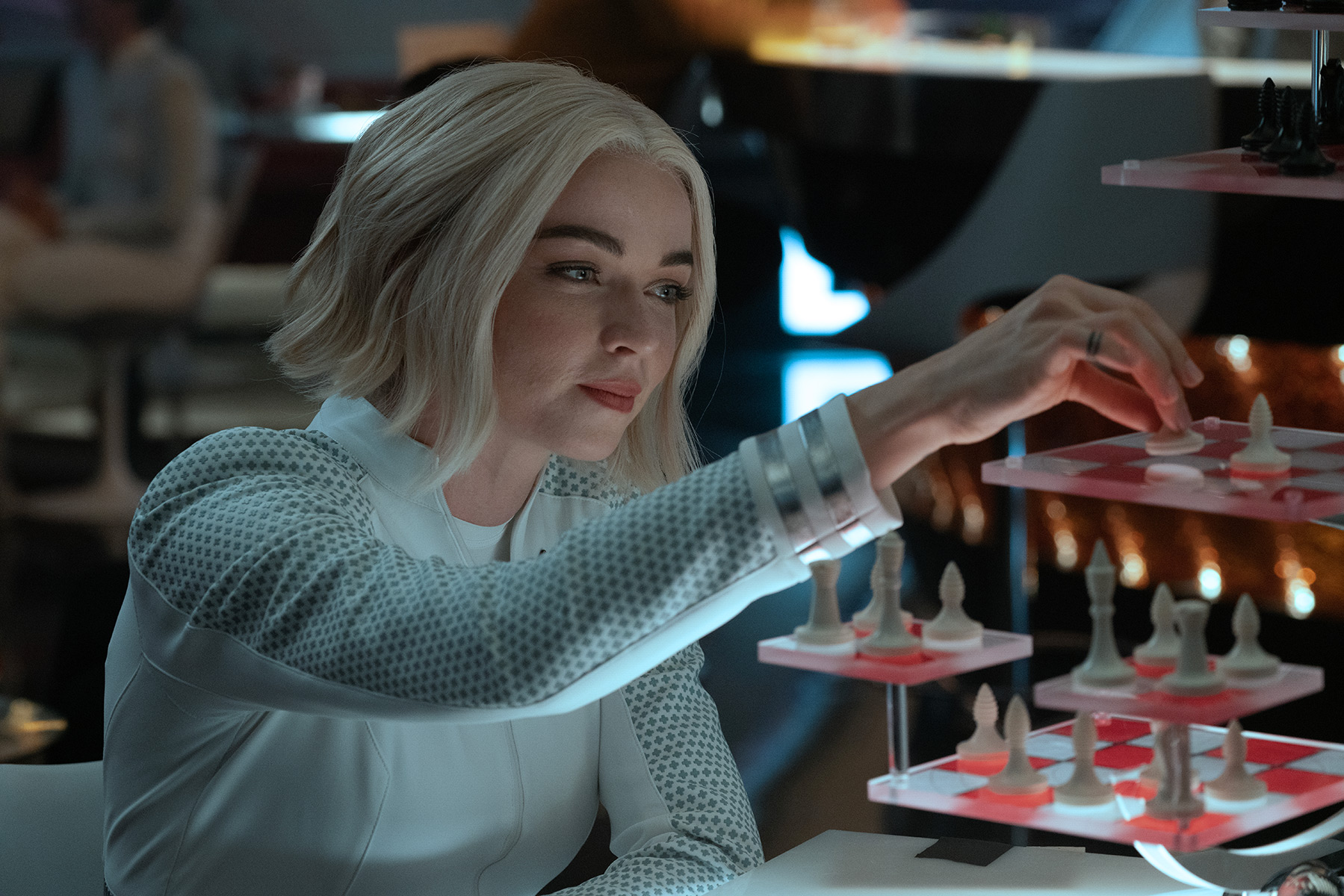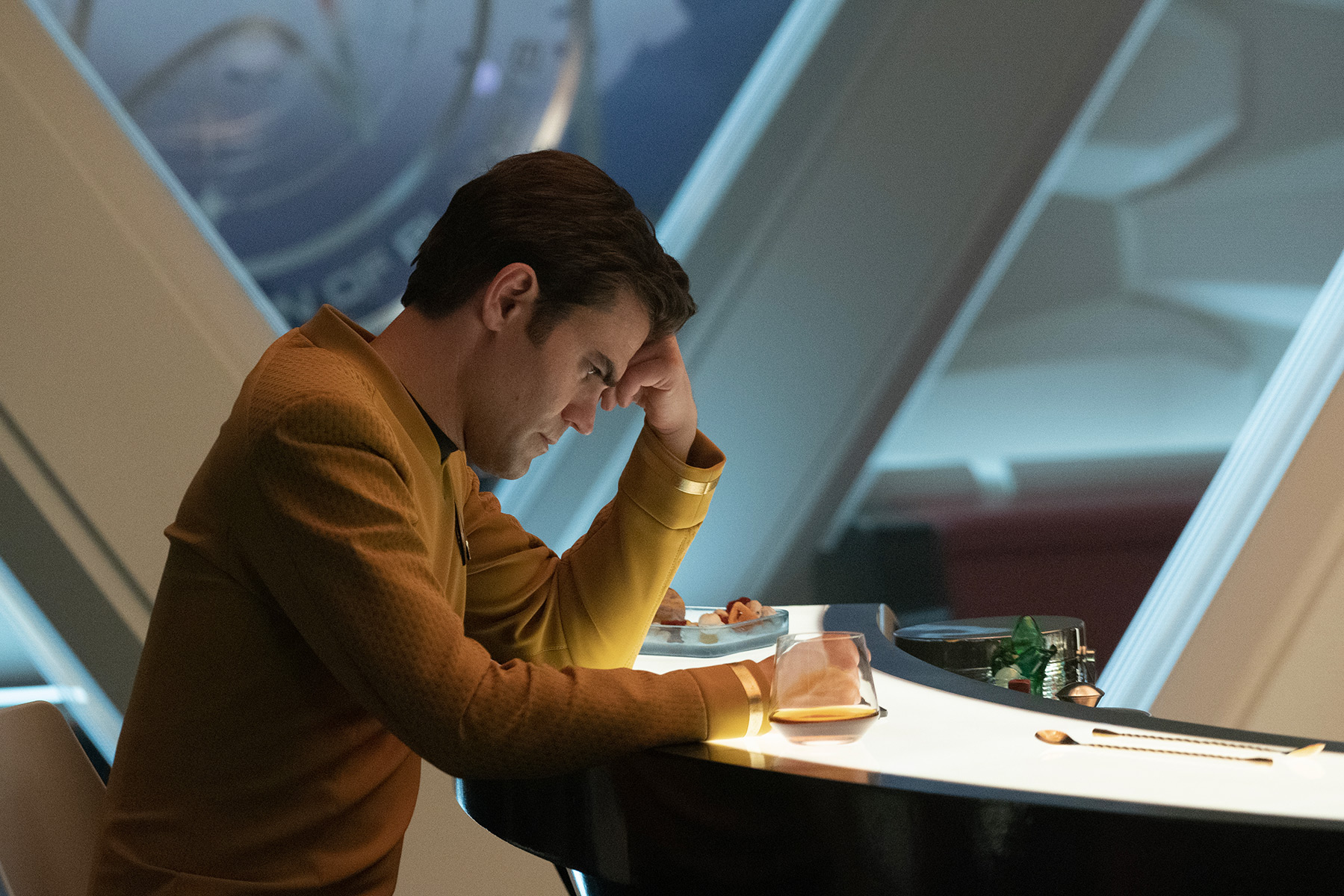“Lost In Translation” Explores Uhura’s Grief On ‘Star Trek: Strange New Worlds’
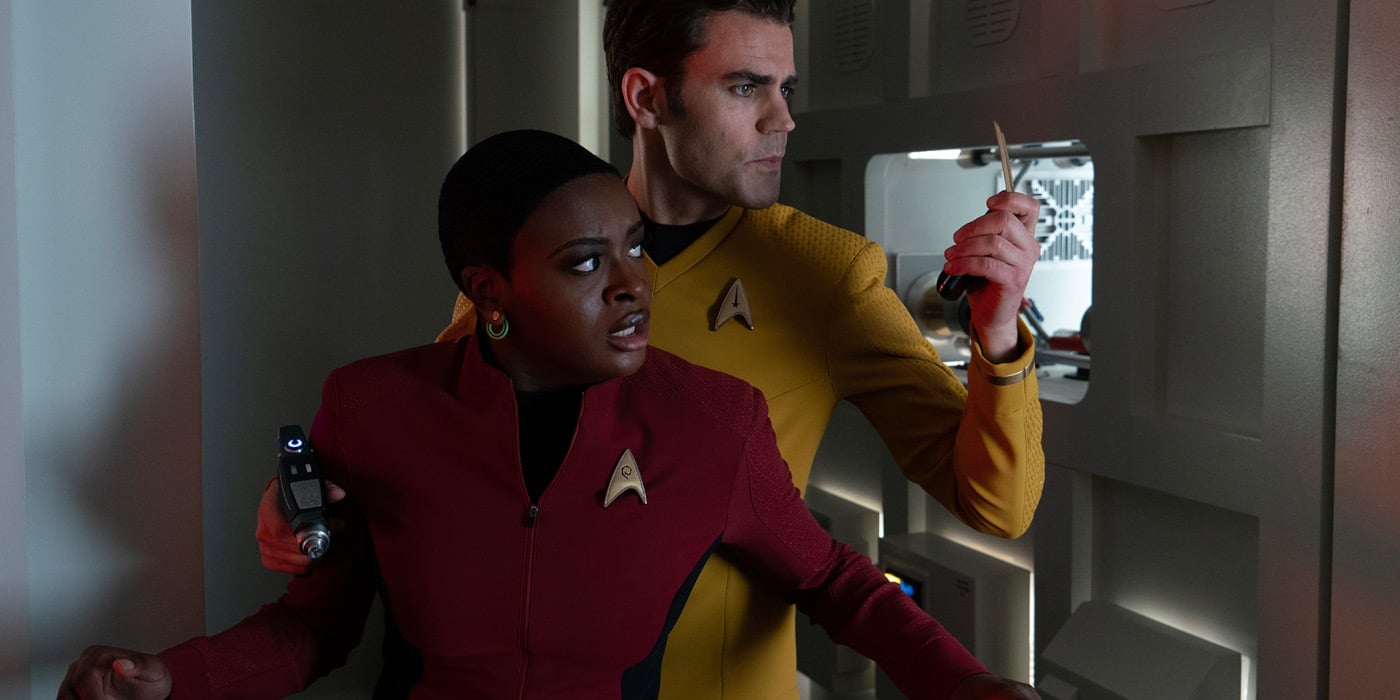
Support the WGA and SAG strikes. Also this latest episode of Star Trek: Strange New Worlds “Lost in Translation” is really touching.
Hey! Remember last season when Uhura drops into a casual convo that her parents and brother died in a horrible shuttle wreck? And that’s why she’s in Starfleet. She’s running from all her pain and anguish? And then on the job, Hemmer dies right in front of Uhura’s eyes later that same season? Kinda seems like we should do something about that, right?
Welcome to “Lost in Translation”–the episode where Star Trek: Strange New Worlds does something about that.
The brief goes thusly: while setting up a deuterium refinery (intergalactic gas station) Enterprise and the Farragut encounter strange phenomena. Both Uhura and Ensign Ramon begin hearing and seeing things. Ramon loses grip on reality (or so everyone thinks) and tries to sabotage the refinery. Meanwhile, Uhura seeks the aid of M’Benga, Pike, and eventually, the newly christened Farragut first officer James T. Kirk as she tries to understand her visions and what they mean.
“Lost in Translation” is about the challenge of communicating complex emotions but it’s also about grief and catharsis. And rather than bore you with a recap (you watched it already otherwise you wouldn’t be reading) let’s just dig into the layers, shall well?
To Boldly Review “Lost in Translation”
At the heart of “Lost in Translation” is a very simple question: how do you deal with incalculable loss? Uhura spends most of her time dealing with losing her family and Hemmer by working. And there’s no need to connect the fictional to the actual dots here–that’s what most of us do. Grind through the pain and assume it’ll go away on its own.
“Lost in Translation” uses Ensign Ramon as our cautionary tale. What if Uhura doesn’t make time to deal with the noise in her head? In the literal sense, Ramon goes near catatonic before blowing himself into the vacuum of space. And whether you view that as a metaphor for taking one’s own life or merely death via the crushing weight of grief, the warning is pretty clear.
What works best, though, is the quiet conversation surrounding how to help with someone’s grief. Enterprise is full of helpful helpers. Pike wants to consider the practical. M’Benga wants Uhura to rest. But they’re both circumventing the problem because everyone is focused on the refinery and work in general.
What a brilliant choice to have the more impulsive and emotionally-guided Kirk be the one whose help is actually helpful. Not only does “Lost in Translation” offer insight into how Kirk and Uhura meet, but it also shows us why Uhura and Kirk work so well together once Kirk becomes captain. These are two people guided by empathy.
Mommy and Daddy Talk to Animals
The alien component of “Lost in Translation” reminds me a little of 2016’s Arrival. Both are stories about our inability to communicate. But whereas Arrival focuses on the macro (how do we communicate to save the world), “Lost in Translation” focuses on the micro (how do we communicate to save the one).
The “aliens can’t communicate directly” is a tried and true Trek trope. But what makes “Lost in Translation” distinct is that it’s not about the aliens at all. This isn’t an examination of what defines sentience, it’s an acknowledgment that sometimes brains aren’t obvious. “Lost in Translation” isn’t a story about understanding aliens, it’s a story about how hard it is to understand ourselves.
The literal story is about Uhura figuring out that the refinery is killing these aliens. But the story is actually about how Uhura’s unexamined trauma is killing her. It’s about why therapy works. Because learning what to do with a dead family and a dead mentor takes more than a day off, it means processing grief. That’s the thing Kirk intrinsically gets.
And that’s a wonderful counterpoint to the Wrath of Khan “you’ve never faced death” speech. Because of course, Kirk has faced death! His brother Sam dies! What makes Kirk exceptional is that, even before that, he understands how to ask the right questions and when to just listen. And what makes Uhura exceptional is her ability to hear Kirk (or anyone for that matter) and translate good words into good action.
Strange New World’s Good Problem
“Hey, isn’t this a review? Where’s the criticism?” Glad you asked, reader. Star Trek: Strange New Worlds has a cast of a thousand issues. And they’re currently dealing with that by trying to get as many characters to have their episodic moment as possible. In a 22-episode season, there probably wouldn’t be a Spock/Chapel subplot. And La’an having complex Kirk feelings probably could’ve waited for another episode, too.
Instead, time gets borrowed in a story that’s already dealing with a very heavy lift. “Lost in Translation” is already an episode where Uhura deals with grief, but it’s also an episode about how everyone feels Hemmer’s loss in particular. It’s also about Sam Kirk’s insecurity? Please give us a reason to like Sam one of these days, show.
There’s a wonderful subplot between Una and Pelia where Pelia rightly points out that Una ignores her because she’s still grieving Hemmer. Unfortunately, that subplot feels sidelined. This story would be much better served if it was about how everyone deals with Hemmer’s death, not just Uhura.
This is what we in the industry call a “nitpick” (a little-known scientific term). It’s a little bit of a “here’s how I would’ve done it” but the bottom line is this: there’s some stuff in here that feels like it’s only present because the season is only ten episodes and so we have to have to cover EVERYTHING RIGHT NOW. The episode would be better served if it had room to breathe. Speaking of which.
“Lost In Translation” and the Strike
First of all, just to call out their great work: “Lost in Translation” is written by Onitra Jones and David Reed. They do a wonderful job here. The writers on Star Trek: Strange New Worlds are incredibly gifted, but they are also incredibly overworked, as are the actors.
They say write what you know. And it’s not much of a stretch to say that the SNW writers and performers(just like the rest of us) haven’t really had time to adequately grieve since 2020. I suspect that “Lost in Translation” is in no small part about how overworked, over-stressed and helpless we all feel right now.
Do you know what makes it easier to grieve? Time. Do you know what would give writers and performers (and workers in general) more time? A fair wage for reasonable hours. Oh, would you look at that, the Writers Guild of America and the Screen Actors Guild are both striking right now over the total lack of fair wages among a host of other issues. Star Trek: Picard‘s own Michelle Hurd explains some of the larger issues perfectly in fact!
Think of Bruce Horak who appears in only one episode as Hemmer (so far) this season. This episode in fact! He deserves a fair wage for making us cry (again).
How can you help? So glad you asked! The best way is by donating to the Entertainment Community Fund so that workers have money for basic human needs as they fight for better wages and better working conditions both now and into the far-flung Star Trek future.
Make it so!

